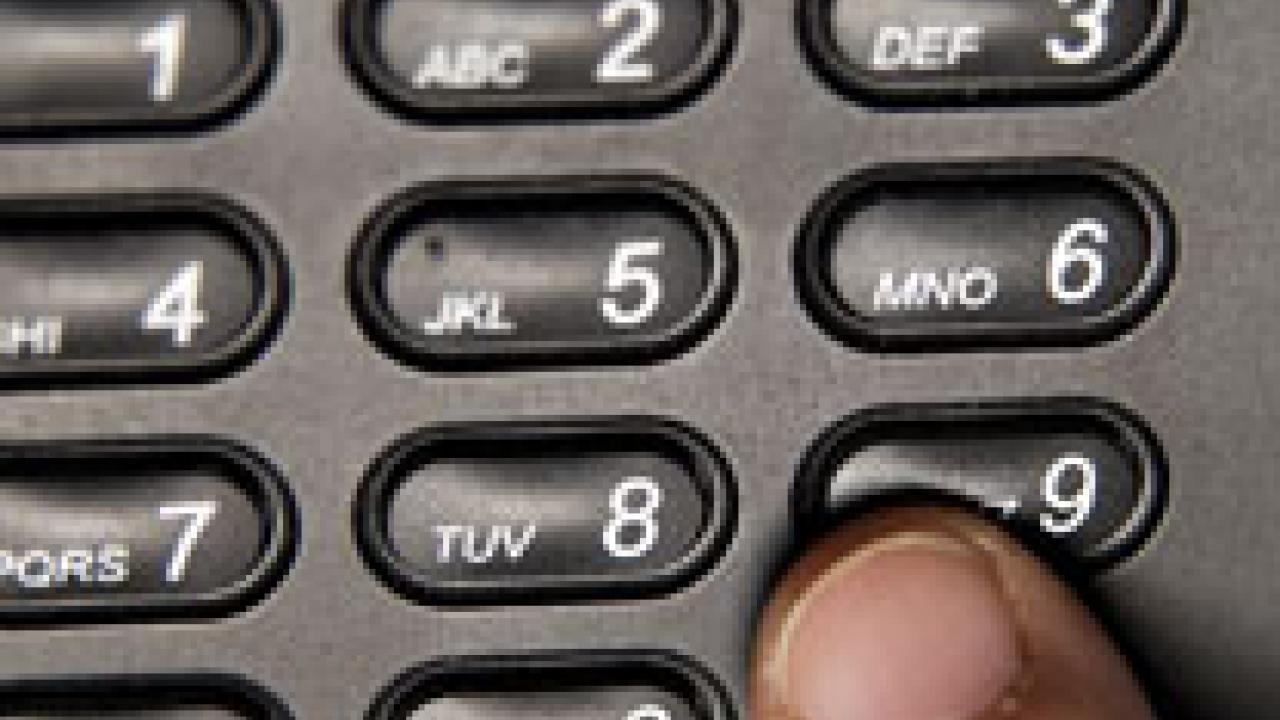I pressed 9 for an outside line, then 1 for a long-distance number. And, then, somehow, another 1.
Oops. I immediately sensed that I had done something wrong on the News Service fax machine. So I started over, sent my fax and returned to my desk.
Within minutes, a UC Davis police officer showed up in our office on the third floor of Mrak Hall. Sgt. Jennifer Garcia spoke with Aggie Malloy in our office, and soon Malloy was speaking with me.
“Mr. Jones, did you just use the fax machine?”
“Uhhhh, yes.”
“Did you misdial?”
“Uhhhh, maybe.”
And just like that, my call had become a statistic: one more accidental 911 call to the UC Davis police-fire dispatch center. Earlier this year, police Capt. Joyce Souza decided to research the problem, to see how many such calls come in and how much time they were taking — time when officers and dispatchers might be needed in real emergencies.
The numbers are startling: In 2008, accidental 911 calls on the Davis and Sacramento campuses totaled about 4,800 — nearly four times the number of real 911 calls (1,228 for police and fire).
Dispatchers cleared up more than 4,000 of the accidental calls in a hurry, Souza said, by talking with the people who called (if they stayed on the line), or calling back.
But in nearly 700 cases, no one answered the return calls, or the 911 calls had come from fax machines — so the Police Department sent one or two officers to investigate.
The responses, all told, took 183 hours of officer time, Souza said. That is four to five weeks of salary. And the total does not include dispatchers’ time on all 4,800 accidental 911 calls — maybe three to five minutes each.
So, what is Souza doing about it? Working with Communications Resources on a plan that could lead to a new digit — probably 8 — to get an outside line, perhaps some time next year. UCLA and UC San Diego already use 8, and UC Santa Cruz uses 6.
A formal proposal, now being drafted, will go first to Information and Educational Technology, then to campus leadership.
Mark Redican, senior manager for Communications Resources, said “the switch would be relatively simple” — by reprogramming the campus’s electronic switchboards.
“The real task will be educating and working with folks and getting the word out,” he said. For an introductory period, the campus phone system is likely to accept either a 9 or an 8 to get an outside line, he said.
Souza said: “We know these accidental 911 calls are just that — accidental. You may hit the 1 twice by mistake. Or sometimes the phone malfunctions, maybe the 1 key is sticky.”
The problem also crops up with international calls, when first you dial a 9, then the international access code of 011 — and you forget the 0.
“We treat all 911 calls as priorities,” Souza said, “Everything else stops until we figure out what is going on.”
And, when officers are responding to what turns out to be an accidental 911 call, “we could potentially be taking away resources that are needed for a real emergency.”
The best thing you can do if you dial 911 accidentally, and you know you did it? Stay on the line and explain to the dispatcher what happened.
Or, if you have already hung up, Souza said, “please answer the phone when it rings — because it will be the dispatcher calling to confirm the emergency call. Some people are too embarrassed to answer the phone.”
“It’s OK if you messed up,” Souza said. “Don’t feel bad, I’ve even done it from my own office, on more than one occasion.”
The 911 system automatically identifies the numbers of the phones from which 911 calls are placed — allowing dispatchers to call back. But, in my case, when I accidentally dialed 911, the dispatcher could not call back — because I was using a fax machine. So the dispatcher traced the machine to the third floor of Mrak Hall, and Sgt. Garcia came calling. In similar cases, if officers have time, they will have a chat with you about being more careful when dialing.
“It’s for your safety,” Souza said. And it is for police safety, she said, because officers — if they suspect a 911 call is an accident — can get complacent about their response. “It’s human nature,” she said.
So, what should I have done when I thought I had called 911 by mistake from a fax machine? I should have called the dispatch center, at (530) 752-1727, to explain what had happened.
Media Resources
Clifton B. Parker, Dateline, (530) 752-1932, cparker@ucdavis.edu
